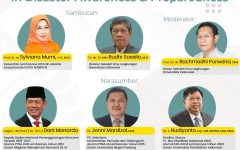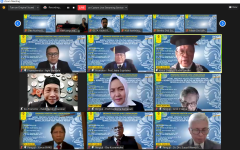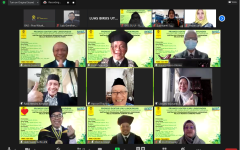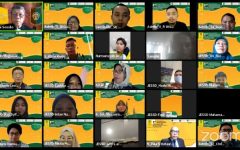Doctoral Promotion of Royke Lumowa: Structuring Unlicensed Gold Mining Towards Sustainable People’s Mining
August 9, 2023 2024-12-21 17:17Doctoral Promotion of Royke Lumowa: Structuring Unlicensed Gold Mining Towards Sustainable People’s Mining
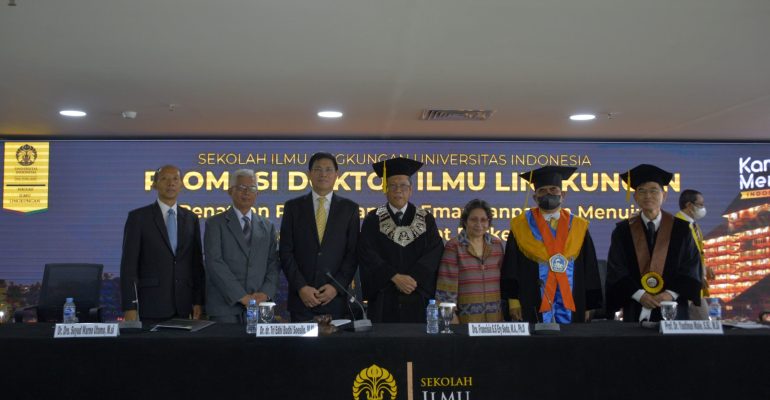
Doctoral Promotion of Royke Lumowa: Structuring Unlicensed Gold Mining Towards Sustainable People’s Mining

University of Indonesia’s School of Environmental Science (SIL UI) has awarded Royke Lumowa his 61st doctorate and his 178th in Environmental Science.
At the open doctoral promotion session, Royke Lumowa successfully defended his dissertation entitled “Structuring Unlicensed Gold Mining Towards Sustainable People’s Mining”. He said that the practice of unlicensed gold mining (PETI) continues to occur in Indonesia. “Unlicensed gold mining (PETI) is a phenomenon that has always been an unfinished concern in Indonesia. The PETI phenomenon occurs in almost all regions of Indonesia, namely in Sumatra, Kalimantan, Papua, Sulawesi, Java, Nusa Tenggara, and Maluku. In the Maluku region, PETI cases occur in the Mount Botak area and its surroundings in Buru Regency,” Royke Lumowa explained.
The practice of PETI has caused environmental damage/pollution, decreased the economy of the surrounding community, and social changes. “The impact of PETI in Gunung Botak has caused environmental damage, security and order disturbances such as social conflicts, murders and health problems of the mining community,” said Royke Lumowa.
The impact of PETI on Mount Botak has caused environmental damage, security and order disturbances such as social conflicts, murders and health problems of the mining community. The environmental impact, for example, is the high level of pollution and contamination of mercury and cyanide in irrigated agricultural land around the Gunung Botak area. The economic impact on coastal communities is the strong stereotypical view that consumers of fish caught in a number of coastal villages around the Gunung Botak area are considered unfit for consumption because of mercury contamination.
The strong impact of environmental, economic, and social order damage due to PETI activities, as well as the pragmatism of the people around the area to fulfill their needs, the potential for the re-emergence or vulnerability of the absence of PETI activities in the Gunung Botak area and its surroundings, Buru Regency, Maluku Province is inevitable.

He explained that concrete steps need to be taken, in this case the state as the holder of the power of natural resource management is needed. The Indonesian National Police as a representation of the state has the main authority to curb these practices to encourage the realization of sustainable community mining. “As a representation of the state, the role of the National Police to initiate an influential role of the National Police to maintain the achievement of the situation of the absence of PETI activities inclusively or prevent the re-occurrence of PETI activities in the area on an ongoing basis, plays an important role in encouraging sustainable community mining practices,” he said.
Therefore, Royke Lumowa said that a study was needed to find out the problems related to the achievement of the sustainable development agenda in sustainable community mining practices. “This research aims to build a model of the role of the National Police to create a situation of inclusive absence of PETI activities in order to achieve the goal of sustainable artisanal mining practices in the Gunung Botak area and its surroundings, Buru Regency, Maluku Province,” he said.
The method used in this research uses a qualitative approach and combined data collection. Quantitative analysis through SEM test, and descriptive qualitative analysis. The results of this study found that the main role of the National Police in controlling PETI on Mount Botak influenced the achievement of the absence of PETI activities. The achievement of these aspects is even greater with the presence of Polri’s non-formal role, namely the role of influence.
This research concludes that the institutional role of the Police (formal) and the role of influence (non-formal) have the potential to create inclusiveness of the absence of PETI practices to realize sustainable community mining in Gunung Botak and its surroundings.
According to Royke, several related parties continue to seek legalization of mining through WPR (People’s Mining Area). As a result, WPR in Gunung Botak has been determined by the Ministry of Energy and Mineral Resources through the Directorate General of Mineral and Coal, and is currently in the process of following up on IPR (People’s Mining Permit) licensing by the Maluku Provincial Government while continuing to prioritize environmentally friendly mining.
In closing, Royke Lumowa made four recommendations for the central and regional governments. First, a more affirmative legal framework is needed in the issue of curbing PETI practices that prioritizes the creation of procedural and distributive aspects of social, economic and ecological justice for communities around mining areas. Second, social and economic welfare programs are needed at the grassroots level to encourage inclusive management of the absence of PETI practices in the WPR institutional framework.
Third, central government supervision is needed to manage and prevent the phenomenon of the return of PETI practice activities through social and economic empowerment programs. The fourth recommendation is to ensure that the process of institutionalizing WPR and IPR management is based on the actual needs of the area and the fulfillment of local community access.
In person, Royke Lumowa also delivered two recommendations for the Police institution. First, the national presence of the National Police needs to support the central and regional governments in the implementation of social and economic development policies for communities around mining areas to ensure the achievement of economic interests, social and environmental protection. Second, the National Police needs to improve their knowledge on sustainability to encourage their role in sustainable mining practices.

Royke Lumowa successfully earned his Doctorate degree with cum laude graduation. He completed 5 semesters of study with a GPA of 3.99. The Doctoral Promotion Session was held in a hybrid manner, on Saturday (31/12), chaired by Dr. dr. Tri Edhi Budhi Soesilo, M.Si. with promoter Dr. Drs. Suyud Warno Utomo, M.Si. and Dr. dr. Tri Edhi Budhi Soesilo, M.Si. and Dr. Hariyadi, S.IP., M.PP. as co-promoters. The Doctoral promotion session was also attended by a team of examiners including Prof. Dr. Chryshnanda Dwilaksana, M.Si., Prof. Dr. Yusthinus Male, S.Si., M.Si., Prof. Dr. Kosuke Mizuno, Dra. Francisia Saveria, M.A., Ph.D., and Dr. Evi Frimawaty, S.Pt., M.Si.


